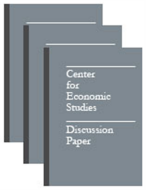The Grandkids Aren't Alright: The Intergenerational Effects of Prenatal Pollution Exposure
The Grandkids Aren't Alright: The Intergenerational Effects of Prenatal Pollution Exposure
Abstract
Evidence shows that environmental quality shapes human capital at birth with long-run effects on health and welfare. Do these effects, in turn, affect the economic opportunities of future generations? Using newly linked survey and administrative data, providing more than 150 million parent-child links, we show that regulation-induced improvements in air quality that an individual experienced in the womb increase the likelihood that their children, the second generation, attend college 40-50 years later. Intergenerational transmission appears to arise from greater parental resources and investments, rather than heritable, biological channels. Our findings suggest that within-generation estimates of marginal damages substantially underestimate the total welfare effects of improving environmental quality and point to the empirical relevance of environmental quality as a contributor to economic opportunity in the United States.
Others in Series
Working Paper
Working Paper
Working Paper




